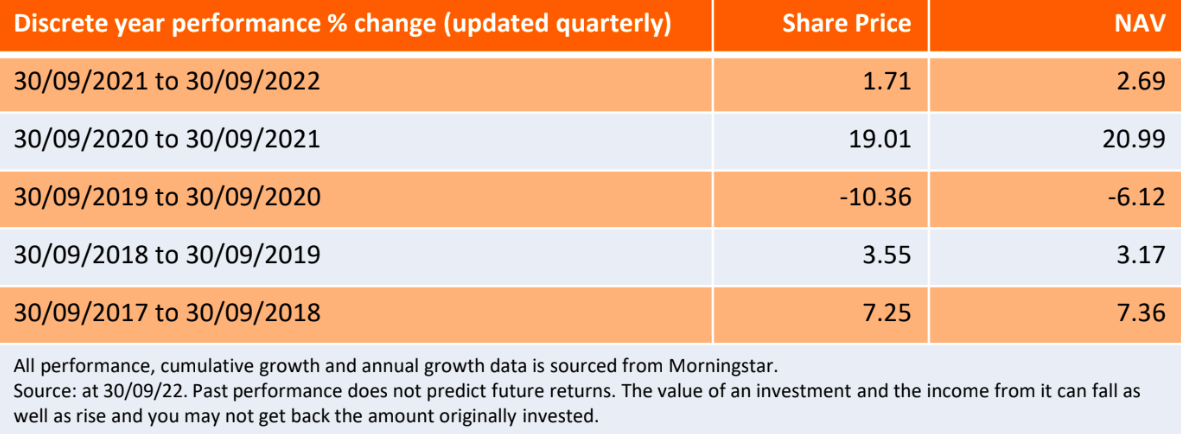

Investment Environment
Global equity markets, as measured by the MSCI World Index, rose by 2.2% in sterling terms in the third quarter of 2022. The positive sterling return was largely due to weakness in the pound, which fell on concerns over UK growth and domestic fiscal policy. The Company’s performance comparator, the MSCI ACWI High Yield (ex UK) index, returned -0.75%. Major equity indices fell in local currency terms as high inflation increased the chance of further interest rate hikes, but there was a rally in some of the technology and growth stocks on the hopes that the US Federal Reserve (the Fed) might be nearing the end of its interest rate increases. Emerging markets were especially weak due to disappointing growth in China and the extremely strong US dollar.¹
Portfolio Review
The Company’s net asset value (total return) declined by -2.1% for the period.¹ Share price volatility belies the fact that the operating performance of companies in the portfolio have in many cases exceeded our expectations in what has been another very difficult environment. Dividends have been paid in line or ahead of expectations. Asia underperformed over the period, particularly the Chinese market, due to continued covid lockdowns. Exposure to the insurance sector was reduced after strong relative outperformance, to invest in existing portfolio holdings where we see greater potential for capital growth.
Manager outlook
Inflationary pressures, tightening monetary policy and slowing global economic growth, alongside ongoing geopolitical uncertainty, continues to weigh on investor sentiment and we think further market volatility is likely. While the outlook is challenging, with both business and consumer confidence impacted as costs continue to rise, markets have experienced significant falls this year. This has provided an opportunity to invest in well managed, resilient businesses at more attractive valuation levels. We continue to identify companies with robust free cash flow characteristics and strong balance sheets that we believe are well positioned to navigate the challenging global economic environment.

Footnote
¹Source: Bloomberg as at 30 September 2022
Inflation – The rate at which the prices of goods and services are rising in an economy. The CPI and RPI are two common measures.
Gearing – Gearing is the measure of a company’s debt level. It is also the relationship between a companies leverage, showing how far its operations are funded by lenders versus shareholders. Within investment trusts it refers to how much money the trust borrows for investment purposes.
Monetary policy – The policies of a central bank, aimed at influencing the level of inflation and growth in an economy. It includes controlling interest rates and the supply of money. Monetary stimulus refers to a central bank increasing the supply of money and lowering borrowing costs. Monetary tightening refers to central bank activity aimed at curbing inflation and slowing down growth in the economy by raising interest rates and reducing the supply of money.
Net Asset Value (NAV) – The total value of a fund’s assets less its liabilities.
Quantitative tightening – Quantitative tightening (QT) refers to monetary policies that contract, or reduce, the Federal Reserve System (Fed) balance sheet. This process is also known as balance sheet normalization. In other words, the Fed (or any central bank)shrinks its monetary reserves by either selling Treasury’s (government bonds) or letting them mature and removing them from its cash balances. This removes liquidity, or money, from financial markets.
Recession – A recession is a macroeconomic term that refers to a significant decline in general economic activity in a designated region.It had been typically recognized as two consecutive quarters of economic decline, as reflected by GDP in conjunction with monthly indicators such as a rise in unemployment.
Valuation metrics – Metrics used to gauge a company’s performance, financial health, and expectations for future earnings eg, price to earnings (P/E) ratio and return on equity (ROE).

